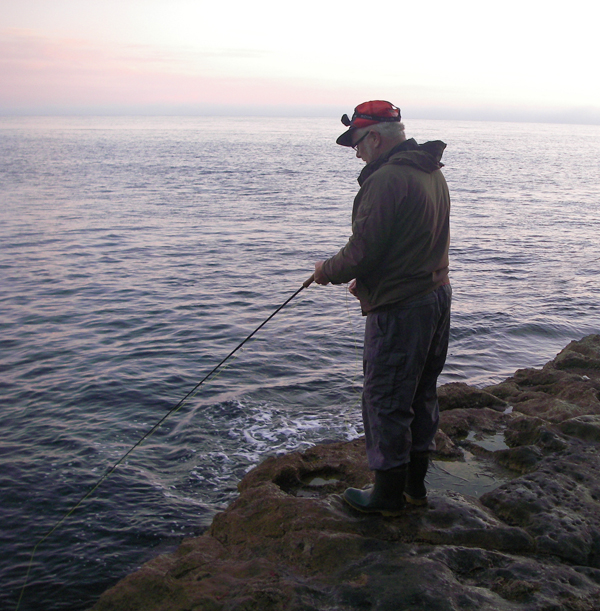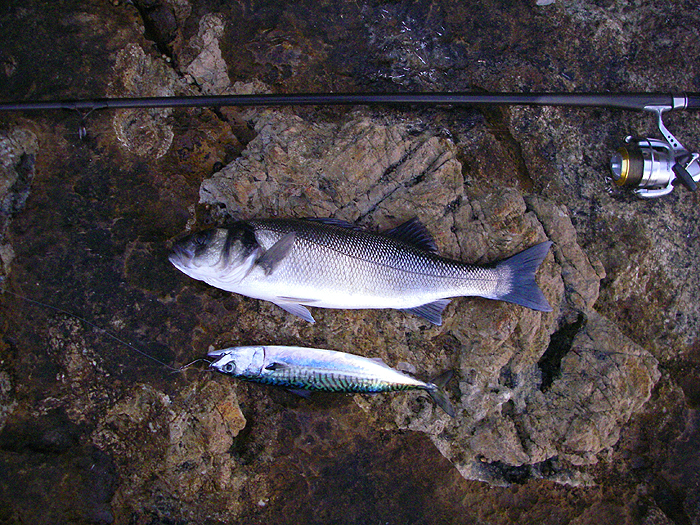

Catch Fish with
Mike Ladle
Information Page
SEA FISHING
For anyone unfamiliar with the site always check the FRESHWATER, SALTWATER and TACK-TICS pages. The Saltwater page now extends back as a record of over several years of (mostly) sea fishing and may be a useful guide as to when to fish. The Freshwater stuff is also up to date now. I keep adding to both. These pages are effectively my diary and the latest will usually be about fishing in the previous day or two. As you see I also add the odd piece from my friends and correspondents if I've not been doing much. The Tactics pages which are chiefly 'how I do it' plus a bit of science are also updated regularly and (I think) worth a read (the earlier ones are mostly tackle and 'how to do it' stuff).
More livebait.
What a week! The calm weather has brought quite a few small baitfish inshore and me and my pals have been trying to 'make hay while the sun was shining'. I've actually managed five early mornings on the trot myself and never regretted a second of it. To be fair none of my sessions was much more than an-hour-and-a-half so I was generally home for breakfast just after seven o'clock. On three occasions I was joined by one of my pals and I reckon that, in all we put in twelve man hours of fishing and the catch totalled something like - forty pollack to three pounds, twenty-five mackerel and nine bass, the best well over six pounds. Roughly six fish an hour and most of them caught on fly tackle. If you knock off four hours of fishing for the dead spell before the sky lightened at the start of every session (better to get there too early than too late), thats almost a fish every five minutes. In addition there are always the inevitable missed bites and dropped fish. Pretty hectic by any sea fishing standards. If we'd all persisted with spinning small lures (wedges or Tobys) and I hadn't bothered livebaiting the catch could have been much larger but it would probably have become a bit tedious. Apart from one or two mackerel taken as bait everything went back and most of them probably lived to fight another day.
The fly sport reached it's peak on the third day and tailed off a bit on the last two. By this time I'd switched to livebaiting and it may be worth saying a bit about my tactics. I no longer bother with floats. leads, swivels, clips or any other paraphernalia. I have two rods set up for these trips. The first objective is to catch a bait and for this I've been using a small silver Toby armed with a single, debarbed hook. The idea is to have a bait lightly hooked and in mint condition. I simply cast the spoon out and wind it back at a steady rate to avoid slack line loops in the braid. Usually the session starts more or less in the dark and the first ten minutes are biteless. Then I'll start to get knocks, probably from small pollack because I miss most of them and after perhaps twenty minutes I'll hook a mackerel. As quickly as possible I unhook it, put the 6/0 circle hook on the other rod through its upper lip and lower it gently into the sea. It normally swims away at a rate of knots and I allow the line to run through my fingers until the fish is perhaps fifty metres away from where I'm standing.
Now comes the long stand. As a rule my pal will still be still catching fish on the fly or on lures so there's something for me to watch while I'm waiting. The mackerel are perfect livebaits and simply keep swimming back and forth like a dog on a leash. If they start to approach a snaggy rock I wind them in a little and they usually turn round and swim in the opposite direction. The fast tail beat of a mackerel is transmitted to the rod tip by my braided line and I can watch (and feel) the rod nodding at a brisk pace as the bait is swimming about. Then comes the exciting bit. Often there's a bit of a bump or a jar on the rod and the line begins to stream out through my fingers at a much faster pace than before. I let it go until the fish has taken ten, twenty or even more metres of line. I hold my breath, flick the bale arm gently over and wait for the line to tighten. With luck the rod bends and the fish is on.
On my last livebaiting trip (my second of the week), I'd waited for what seemed like an age (thirty minutes?) before the magic moment when the bass took. When I tightened to the fish I could feel the weight but it didn't put up much of a fight. For a few seconds there's always the slight element of worry in case the hook has failed to get a decent hold but once the clutch begins to buzz confidence increases. Now, I love lure fishing and fly fishing and I've caught lots of good fish on dead baits but there's no doubt that the moment when a bass takes your live mackerel is sheer magic.
If you have any comments or questions about fish, methods, tactics or 'what have you!' get in touch with me by sending an E-MAIL to - docladle@hotmail.com
Nigel

Excellent!
